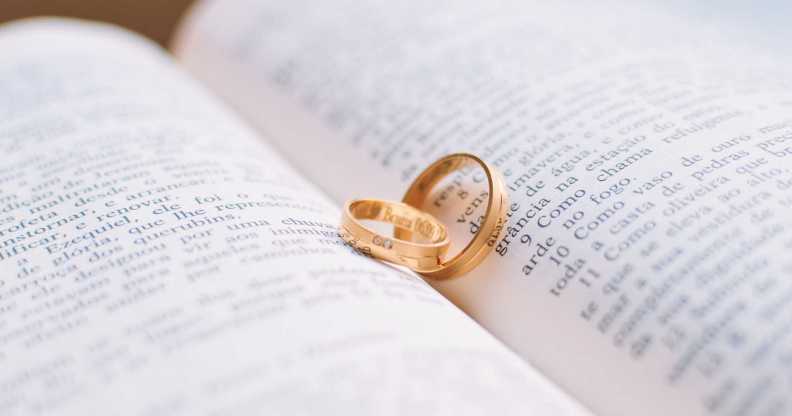Anti-LGBTQ+ Church of England can’t be fixed by MPs – they should disestablish it instead

Stephen Evans argues parliament and the Church of England should separate (Canva)
Instead of trying to make the Church of England embrace same-sex marriage, parliament should separate church and state by beginning disestablishment, argues Stephen Evans, CEO of the National Secular Society
Last week, a group of respected parliamentarians led by Ben Bradshaw MP brought forward a bill to allow for same-sex marriage in the Church of England.
Unlike other religious organisations, the Church of England is explicitly banned from holding same sex marriages by parliament. This arrangement was part of a ‘quadruple lock’ to protect the Church from potential legal challenges when same sex marriage was legalised.
This was felt necessary because, again, unlike other religious organisations, the Church is legally obliged to marry all those who reside within a parish. There was clearly a tension between this duty and its opposition to same-sex marriage.
The Same-Sex Marriage (Church of England) Bill would simply enable clergy to conduct same sex marriages on Church of England premises, if they choose to do so, without breaking the law of the land. This would clearly advance the religious freedom of Anglicans who support same-sex marriage and see no conflict between that and their faith. The Church’s official doctrine would remain its own affair.
On that basis, this is a bill worthy of support. But by Bradshaw’s own admission, the intent behind the legislation is to nudge the Church of England in the direction that the bills proposers want it to go.
The Church’s established status is being used as leverage to get it to adopt a more inclusive doctrine, consistent with the parliamentarians’ own worldview. This is legitimatised by virtue of the Church being established by parliament and subservient to it.
But it’s this archaic arrangement that parliament ought to address, rather that the Church’s doctrine. Establishment strikes at heart of the enlightenment principles of separation of church and state and freedom of religion or belief.
The Church of England has a privileged position
The Church of England’s problem is that it doesn’t just interact with the state, it’s part of it. Our head of state is its supreme governor; its bishops are appointed by the monarch on the advice of the prime minister and enjoy seats in the House of Lords. It runs thousands of state-funded schools.
The concept of a state church in a nation characterised by its religious, racial and sexual diversity is absurd. The Church of England is in the business of ‘proclaiming the good news of Jesus Christ’. That’s fine for those that want it, but it isn’t a mission that accords with vast swathes of the British public.
According to the 2021 census, the number of us ticking the Christian box has fallen to less than 48 per cent. The proportion of the population identifying as Anglican is down to just 12 per cent. Fewer than one per cent of the population attend Anglican services on any given Sunday. And 52 per cent of the public say they do not regard themselves as belonging to any religion.
We’re clearly not a Christian country. The case for dismantling the Church’s relationship with the state is now overwhelming. Parliamentarians would do well to acknowledge this and establish a commission to untangle the ties that bind.
For the time being, such an untethering isn’t something most within the Church are keen to contemplate. Particularly the bishops who enjoy the power and prestige that establishment brings. But perhaps they could be persuaded.
The Church of England can’t have it both ways. To expect the all the status and privileges of establishment with all the independence of other religions and denominations is a classic example of having one’s cake and eating eat. If the Church of England is disestablished, parliament will have no legitimate right to intervene. And that’s the way it should be.
I wish those trying to build a more inclusive church well. It’s worthy work, but it’s not the job of the state – or at least it shouldn’t be.
Clearly an officially homophobic institution has no business being the state church. But ultimately, it’s not just the Church’s prejudice that should be consigned to history, it’s the whole concept of an established church itself.
How did this story make you feel?

